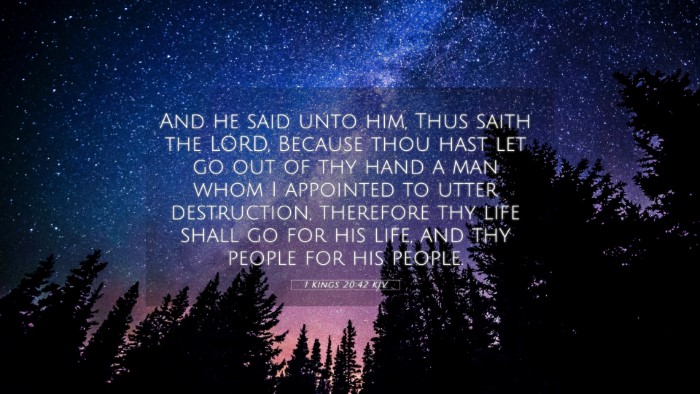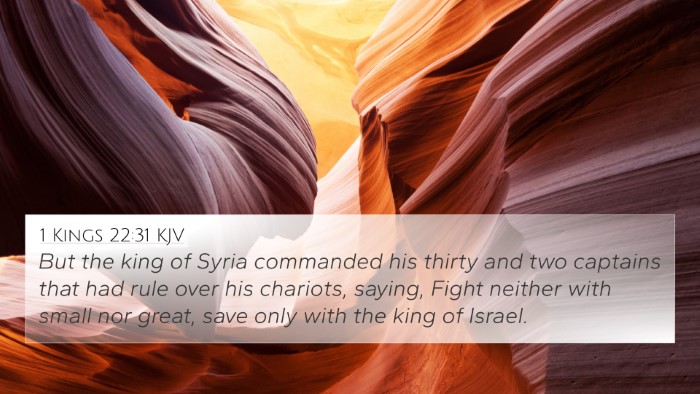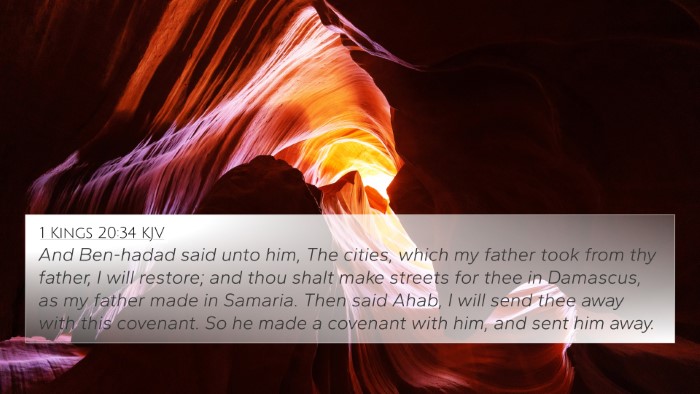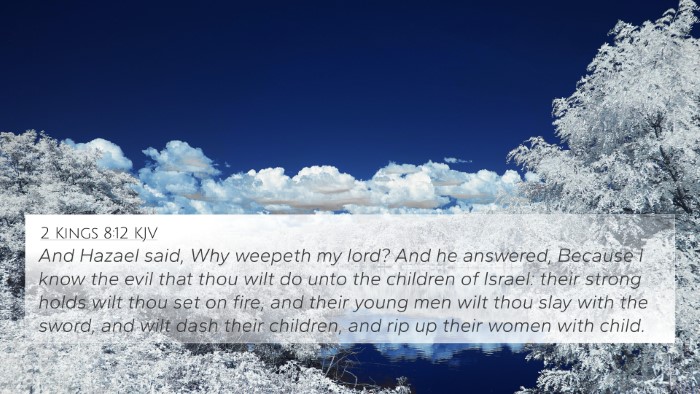Understanding 1 Kings 20:42
The verse 1 Kings 20:42 reads:
"And he said unto him, Thus saith the Lord, Because thou hast let go out of thy hand a man whom I appointed to utter destruction, therefore thy life shall go for his life, and thy people for his people."
Contextual Overview
This verse comes from a narrative about King Ahab of Israel and his encounter with the prophet Elijah. It speaks to the themes of divine judgment and accountability, highlighting the consequences that follow decisions made by leaders.
Commentary Insights
Matthew Henry's Commentary
Accountability: Matthew Henry emphasizes that Ahab’s failure to execute God’s command has serious repercussions, illustrating that leaders who do not uphold the divine will face judgment.
Divine Authority: The phrase "Thus saith the Lord" is indicative of God's sovereignty and His role as the ultimate authority over Israel. Henry points out that Ahab's leniency leads to his own demise, demonstrating the goal of God's justice.
Albert Barnes' Commentary
Consequences of Choices: Barnes comments on the moral implications of Ahab's decision, indicating that choosing to disobey God not only endangers oneself but can lead to the suffering of an entire nation.
Symbol of Judgment: This verse serves as a foreshadowing of the destruction that would come to Ahab's house because of his choices, thereby linking his immediate actions to long-term consequences.
Adam Clarke's Commentary
Prophetic Warning: Clarke explains that this verse serves as a prophecy delivered through the unnamed prophet. The prophetic voice reflects on Ahab's pride and the judgment that follows his sparing of Benhadad.
Thematic Elements: He notes the themes of mercy and judgment which are woven throughout this narrative, highlighting the tension between divine mercy for sinners and the requirement for justice.
Related Bible Cross-References
- 1 Samuel 15:23 - God's rejection of Saul for disobedience serves as a parallel to Ahab's situation.
- 2 Samuel 12:7-9 - Nathan's confrontation with David parallels Ahab's accountability for his actions.
- Jonah 1:1-2 - The theme of prophetic intervention and judgment is seen through Jonah's command from God.
- Jeremiah 18:7-10 - This passage illustrates God's conditional mercy based on the repentance and obedience of individuals or nations.
- Ezekiel 18:30-32 - The call for repentance echoes God's demand for justice intertwined with mercy.
- Matthew 10:28 - The danger of physical death versus spiritual judgment reflects into Ahab's choices.
- Luke 12:48 - “To whom much is given, much will be required” resonates with Ahab’s higher accountability as a leader.
Conclusion
1 Kings 20:42 serves as a profound reminder of the weight of leadership, the importance of obedience to divine commands, and the dire consequences of failure to uphold God's will. The connections drawn from various biblical texts serve to enrich our understanding of thematic justice and mercy within the biblical narrative.
Tools for Further Study
To delve deeper into the complexities of this verse and its implications, consider using the following resources:
- Bible Concordance: A tool for finding specific references and themes within Scripture.
- Bible Cross-Reference Guide: Essential for connecting verses with similar themes or teachings.
- Bible Chain References: Helpful for tracing consistent themes through interconnected scriptures.
- Cross-Referencing Bible Study Methods: Techniques for examining similar scriptures across the Old and New Testaments.









